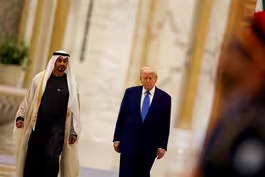
Retired Gen. McChrystal on current Pentagon leadership
Clip: 5/15/2025 | 7m 19sVideo has Closed Captions
Retired Gen. McChrystal on current Pentagon leadership and his new book 'On Character'
General Stanley McChrystal was the top commander of American and international forces in Afghanistan in 2009 when his career was cut short. McChrystal resigned after an article in Rolling Stone quoted him and his aides making candid yet disparaging remarks about President Obama and Vice President Biden. He joined Amna Nawaz to discuss his new book, “On Character: Choices that Define a Life.”
Problems playing video? | Closed Captioning Feedback
Problems playing video? | Closed Captioning Feedback
Major corporate funding for the PBS News Hour is provided by BDO, BNSF, Consumer Cellular, American Cruise Lines, and Raymond James. Funding for the PBS NewsHour Weekend is provided by...

Retired Gen. McChrystal on current Pentagon leadership
Clip: 5/15/2025 | 7m 19sVideo has Closed Captions
General Stanley McChrystal was the top commander of American and international forces in Afghanistan in 2009 when his career was cut short. McChrystal resigned after an article in Rolling Stone quoted him and his aides making candid yet disparaging remarks about President Obama and Vice President Biden. He joined Amna Nawaz to discuss his new book, “On Character: Choices that Define a Life.”
Problems playing video? | Closed Captioning Feedback
How to Watch PBS News Hour
PBS News Hour is available to stream on pbs.org and the free PBS App, available on iPhone, Apple TV, Android TV, Android smartphones, Amazon Fire TV, Amazon Fire Tablet, Roku, Samsung Smart TV, and Vizio.
Providing Support for PBS.org
Learn Moreabout PBS online sponsorshipAMNA NAWAZ: General Stanley McChrystal was the top commander of American and international forces in Afghanistan in 2009, when his career was cut short.
An article in "Rolling Stone" quoted him and his aides making candid, yet disparaging remarks about President Obama and Vice President Biden.
McChrystal resigned after 35 years in the Army.
Among the units he led in that career, the Joint Special Operations Command, which hunted down al-Qaida in Iraq when the United States was bogged down in that war.
He now has his own consulting firm and is the author of a new book, "On Character: Choices That Define a Life."
I spoke with him earlier this week and began by asking him about the current leadership at the Pentagon and the controversy around Defense Secretary Hegseth's sharing of classified information on a commercial messaging app.
GEN. STANLEY MCCHRYSTAL (RET.
), U.S. Army: Well, like most Americans, I'm concerned about the Department of Defense because it's responsible for all our defense.
If I look at something like Signalgate, as we will call it, mistakes get made.
To me, that came across as people acting in an immaturish fashion.
And they make a mistake and you move on.
But you accept responsibility for that mistake.
And what bothered me most about that particular incident was the days after, when professionals who were involved in that went in front of television and I think some testified in front of Congress and they claimed that the information was not classified.
And they know better.
AMNA NAWAZ: And what's the impact of that?
I mean, I have had several conversations with people who've said, had it been anyone else in the military, obviously lower ranking than the secretary of defense, had they done what Secretary Hegseth did, there would be consequences.
The fact that there were none, what message does that send?
GEN. STANLEY MCCHRYSTAL (RET.
): I fear that it sends a lack of seriousness.
I think that somebody junior would have been held to account, and most people junior believe they would have been held to account.
And so I think the nation needs to have confidence that we are going to fix the mistakes we will make, for sure.
And so, going forward, I think it's critical that we establish that culture of accountability.
AMNA NAWAZ: After you assumed command of the U.S. and coalition forces in Afghanistan, you issued guidance that would reduce the number of civilian casualties.
That was a priority for you.
One source that we spoke to who studies this said, the casualties from airstrikes dropped 60 percent because of the policies and the protocols that you put into place.
There are now civilian harm mitigation teams at every combatant command.
What do you make now of the decision by this administration to stop funding those teams?
What will happen as a result of that?
GEN. STANLEY MCCHRYSTAL (RET.
): I think it will turn out to be something we need to refund again in the future, because we relearn a lot of lessons.
In Afghanistan, when we made that decision and we worked very hard to reduce civilian casualties, it wasn't just because we were nice people or that it was the morally right thing to do, which it was.
We did it because we judged that the only way we could succeed in that effort was to win the support of the population.
And you don't win the support of the population by killing them.
AMNA NAWAZ: Back here at home, I should note, you spend a good part of the book on Gettysburg, about this place that clearly holds a special resonance for you, why it matters today in particular.
And you write in the book: "We must remember Gettysburg and why it happened.
The veneer of unity and civilization we take for granted is too familiar to feel fragile, yet North and South toward each other less than a century after uniting to create a nation.
Of course it could happen again."
You're saying of course it could happen again.
Are you worried about that level of violence in America because of our divisions today?
GEN. STANLEY MCCHRYSTAL (RET.
): I am.
And I worry that we sometimes talk about those things sort of lightly.
We say we have big divisions, people don't like each other, there's a lots of guns in society and different militias and whatnot, and we just assume that nothing like that could repeat itself.
But, on a small level, it could do it tomorrow.
On a large level, it could do it very easily.
And if we look at other nations, civilized nations that have had significant problems, when Germany descended into Nazi rule, when the United States broke into civil war, I think we need to pay attention, and we need to act with the kind of seriousness that the current divisions represent.
AMNA NAWAZ: You know, when you talk about the politics of this moment, you also reference leaders who easily lie, some acting with craven opportunism, debasing themselves for political success.
I'm paraphrasing some of your descriptions here.
But, General, you never name names.
You're never specific with some of those allegations.
So, if you're talking about President Trump or others around him, why not say who you're talking about?
GEN. STANLEY MCCHRYSTAL (RET.
): As soon as you mention any name, you lose half of the American population.
They will literally turn it off because they don't want to hear it.
If I talked about President Biden, and I think that the people around him potentially didn't represent his condition in the last year of office completely honestly to the American people, that's a disappointment.
If I do the same with people in President Trump's circle on things that disappoint me -- I think it's not limited to one party.
I think it starts with us as individuals, but it is too broad for us to say it's just those people, if we get rid of those people, we will solve the problem.
AMNA NAWAZ: So much of the book is about country and character, but there's some very personal reflections in here as well.
There was one that struck me in particular.
The amount of time you spend talking about your granddaughters, Emilu (ph), Elsie (ph), and Daisy (ph), who you clearly adore, is wonderful.
But if there's an ounce of regret in the book, it's a couple of lines you write about your son, Sam.
You write: "I wasn't a great father.
In retrospect, I regret things I didn't do as a father, but, thankfully, avoided doing many things I would have regretted.
If I could do it all again, I believe I would be a better father, but I don't believe Sam could be a better son."
Why include that?
What would you do differently?
GEN. STANLEY MCCHRYSTAL (RET.
): Well, I was very focused on my career.
I didn't have a lot of other hobbies, but, still, I didn't do many of the things that other fathers did with their sons.
Then, I left for Afghanistan when my son -- right before he graduated from high school.
I essentially came back from Afghanistan, Iraq and Afghanistan again, after he'd finished college and had moved on.
And so I wasn't a lot of things that my father had been to me.
Now, the beauty is, I get a second chance, because my son lives next door to me now, along with my granddaughters.
So, I see him every day.
We have a very close relationship.
But you can't make up for things you didn't do.
AMNA NAWAZ: The book is "On Character: Choices That Define a Life."
The author is retired General Stanley McChrystal.
General, thank you so much for your time.
It's a pleasure to speak with you.
GEN. STANLEY MCCHRYSTAL (RET.
): Amna, it was my pleasure.
Thank you.
A Brief But Spectacular take on a birthright to capital
Video has Closed Captions
Clip: 5/15/2025 | 3m 45s | BRIEF BUT SPECTACULAR (3m 45s)
Chef inspires others to embrace their heritage through food
Video has Closed Captions
Clip: 5/15/2025 | 6m 39s | Lao and Proud: Chef inspires others to embrace their heritage and history through food (6m 39s)
Judge whose son was murdered urges leaders to end rhetoric
Video has Closed Captions
Clip: 5/15/2025 | 7m 16s | 'Lives are at stake': Judge whose son was murdered urges leaders to end hostile rhetoric (7m 16s)
News Wrap: Walmart says it is raising prices due to tariffs
Video has Closed Captions
Clip: 5/15/2025 | 6m 30s | News Wrap: Walmart says it is raising prices due to tariffs (6m 30s)
Supreme Court hears Trump's birthright citizenship challenge
Video has Closed Captions
Clip: 5/15/2025 | 8m 39s | Supreme Court hears Trump’s challenge to birthright citizenship and judicial constraints (8m 39s)
Trump wraps Mideast tour with UAE pledging new investment
Video has Closed Captions
Clip: 5/15/2025 | 5m 30s | Trump wraps Mideast tour with UAE pledging new investments in U.S. (5m 30s)
What's behind the significant drop in opioid overdose deaths
Video has Closed Captions
Clip: 5/15/2025 | 5m 44s | What's behind the significant drop in opioid overdose deaths (5m 44s)
Providing Support for PBS.org
Learn Moreabout PBS online sponsorship
- News and Public Affairs

FRONTLINE is investigative journalism that questions, explains and changes our world.

- News and Public Affairs

Amanpour and Company features conversations with leaders and decision makers.












Support for PBS provided by:
Major corporate funding for the PBS News Hour is provided by BDO, BNSF, Consumer Cellular, American Cruise Lines, and Raymond James. Funding for the PBS NewsHour Weekend is provided by...






